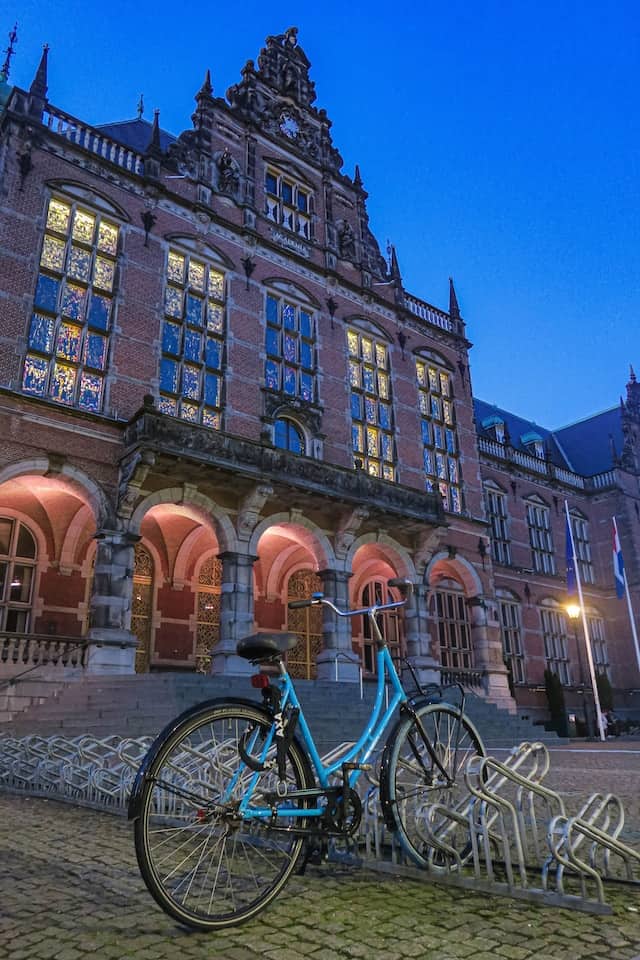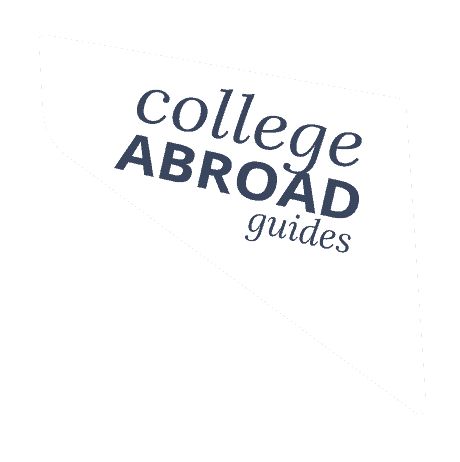Have a Quintessential College Experience at University College Groningen

- Originally published
- Last updated on July 24th, 2023 at 12:56 am
Table of Contents
Groningen’s a (fairly) big city, crawling with students, and determined to live its best life, sometimes past dawn. Join it at University College Groningen.
One student sums up University College Groningen perfectly, saying, “Not only does a good community facilitate a healthy learning environment, but it also opens opportunities later in life.” Students here get a large college in a big city with a small academic cohort in a town built for students. That combo offers unique lessons. Close relationships, but plenty of opportunities. Is it right for you? We’re diving in.
Basics
Associated with: University of Groningen
Degrees: BA, BSc
Concentrations: Social Science, Science, Humanities, or a combination
Location: Groningen, Groningen
English: Yes, the entire program
Cost for out-of-European Economic Area (EEA): €11,766 non-EU
On-campus housing cost: €500/mo
FAFSA funds: No
Abroad from abroad: Yes, there is a year 3 semester abroad option
Student body: 35,000 in the University of Groningen. The university is 40% Dutch, 50% EU, and 10% international, non-EU. UCG admits 150 students per year, around ~600 students total. This year, admission has opened up to 350 places, so this honors college is growing.
Five adjectives: young, flexible, fun, cozy, historical
University College Groningen Ranking
Here’s yet another Dutch parent university in the global top #100. Groningen ranks high. And it gives some of its best teaching to honors college students in this liberal arts program, where small classes and discussions make for more academic rigor than many students wish they’d gotten themselves into.
The University of Groningen has a large, diverse, and well-respected faculty that consistently ranks in the global top 100 on metrics of research prowess, but more impressive is its 2019 #26 global ranking for teaching.
After all, highly cited faculty may never teach a first-year prerequisite class, or they may be so research-focused they don’t connect with students well. Groningen avoids this problem.
The university was ranked in the European Teaching Rankings, which does take faculty reputation in the regular university rankings into account, but also weighs the European Student Survey as 45% of its assessment. The survey asks for student feedback on faculty interaction with students, opportunities to grow as students, and teaching quality.
How Hard Is It to Get Into University College Groningen?
Recently, the university college expanded admissions, doubling the size of its new freshman class. That’s good news for students seeking a space.
But the program is still selective. Unlike its parent university, the University of Groningen, you won’t gain admission by having the right academic credentials alone. Here, you’ll be invited for an interview. Your motivation letter and application packet must show you’re enthusiastic about the program’s format and can contribute meaningfully.
Is University College Groningen a Good University?
Yes, students say that University College Groningen is incredibly good and that its reputation helped them go on to careers in research in the fields they explored while in school there.
One warning that comes up often is that students wonder if they’ll be able to get jobs when they graduate. After all, all the design students studied together and formed a future professional cohort that could help them down the line. Students in liberal arts and sciences, on the other hand, will likely scatter to different careers when they graduate.
One student says, “I think it’s hard to get a job with this degree, since you don’t specialize in the way an economics student will, for example. But that’s just my assumption, I really don’t know yet.”
Students already aiming at graduate school might have less anxiety over their non-traditional path.
The King of Dutch College Towns: Groningen
Groningen is a city where the central city bars do not have a closing time.
It’s a good thing there are no cars permitted in the center of town to impede students staggering back home at sunrise after a long night out in this city with several universities where 25% of residents are students.
Welcome to Groningen, a quintessential student town.
It’s the youngest town in the Netherlands by the age of its residents, and it enthusiastically embraces its student life and its designation as the “best student city in the Netherlands.”
According to one student from the U.S.A., the city of 250,000+ residents is “big enough to feel like a big city but small enough to feel like home.”
Student Life in Historical Groningen
Groningen has been partying for a long time.
Inhabited since 3 CE, according to archeological records, it was originally inhabited by Anglo-Saxons and rose to prominence as a medieval town administering nearby Friesland.
Initially, the university taught theology, law, medicine, and philosophy.
The students started pouring in.
“It really is beautiful. It’s absolutely student-oriented. Small and arguably the most bikeable city on the planet. Everything from the layout, cafés to the nightlife is perfect for students.”
Today, there is a historical Dutch feel in the city around University College Groningen, with its bell-shaped rooflines and canals filled with boats.
While there is lots of history to see in Groningen, the city did suffer losses in World War II. The central market square, where the University College resides, was destroyed and rebuilt following the battle of Groningen at the very end of the war when the Allies were close to entering Germany itself.
Student Hangouts near UCG Today
Overall, Groningen is known for being more laid-back and less touristy than other large Netherlands cities, with local charms that cater to a way of life that’s gezelligheid (the Dutch word for cozy conviviality).
For example, on alternate Sundays, a thrift market takes over the city center, where you can hang out with friends collecting jewelry, books, clothes, and antiques, and listening to live music.
“You can also bike everywhere,” says one student who likes that the town feels small enough that no place feels far away.
Try to get invited to a boat party, and you’ll know you’re really Dutch.
Campus + Housing
Groningen is a student city, and its parent university is huge.
The University College helps alleviate that lost-in-the-crowd feeling, even though the greater university is itself quite international, with about a quarter of students hailing from outside the Netherlands. With 120 English-taught master’s programs, Groningen hosts a broad post-graduate international student community as well, and ~35 out of its ~45 bachelor’s programs are English-taught.
A fab University College Groningen selling point is that first-year housing is guaranteed in the city center. Students at UCG live together in the Frascati building, with private rooms but large, shared bathrooms and kitchens. Frascati is next to the train station and a short walk along the canal to UCG. Second and third-year students must choose between student accommodation and private leasing.
“The structure of the program is very flexible, and the small-scale classrooms allow you to engage with your professors and fellow students on a much deeper level. Which, personally, I think is one of the best features of UCG. The community. It’s such an important aspect of learning.”
Like all the university colleges, a student association helps facilitate social life by planning events and games, and they can connect first and third-year students who may be moving out of their places. Try finding a houseboat to rent, because you’re practically Dutch now, but these are even harder to nail down.
Finding a student house with other UCG students can be a good option, as some students talked about having more difficulty renting as single international students.
The study association can also be a good place to connect with students over committees, helping put together meal nights, ski trips, or the yearbook for students. They host parties and academic discussions and try to weave students together across their first, second, and third years. They also allow students to join 13 committees and meet other students.
Get Flexible with UCG Academics
Combining your Interests
University College Groningen has three typical liberal arts majors: sciences, social sciences, and humanities. First-year students choose from a broad range of interdisciplinary foundation courses before being asked to declare a major area. This can be a “free” combination major comprising more than one liberal arts area.
“The flexibility of the program sets an expectation that students will take initiative in planning their lives. You’re expected to make mistakes and learn from them. To deal with the consequences of choosing.”
There are electives offered even in the first year. However, the freedom in designing this major is flexible but, according to one student, it is narrowing. Students are limited with what they can take outside the faculty of the LAS UAC offerings and still have those courses count toward their degrees.
There is an annual project that ties student work to other organizations and even other educational facilities, culminating in a final project as well as individual essays and reports along the way.
Unique Aspects of UCG Academics
Here, freedom is tempered by annual themes that dictate a frame through which students pursue certain ideas.
There is a topic picked for the year. Then, the first semester is made up of two “blocks.” There are three courses in each of those blocks. Additionally, students take a “challenges” course on the topic that runs across blocks, an academic skills/communications class, and in the second block, an academic research class.
In the first semester, students also get to choose electives like love, war, or how things work (a physics course involving an ice skating field trip to really test your acceleration in action).
Second-semester students can choose a major if they’re ready. They take a methodology course in that path, then choose electives in their specialization area.
In their second year, students focus on their majors. Third-year students find their first semester is called “space for the minor.”
“In the beginning, University College Groningen’s programs were less defined and you had more freedom to choose outside of the faculty. Now, there are more courses offered at the faculty and the specializations are more defined so it’s a fairly balanced change.”
For students who want a multiple-perspectives approach, Groningen is fantastic.
However, students stuck with a topic or approach with which they struggle might not find themselves challenged positively. A student uninterested in the year’s overarching theme, like “sustainability.” Those students are disappointed to find a third of their college careers built around the theme.
Enjoying a Project-Based Education
The unique aspect of Groningen is that a large project is planned each and every year. The program allows students to do an annual project in the year’s overarching theme.
The LAS program focuses on writing with fewer tests than other courses and ongoing small and large group projects. Individual assignments help students design projects with their own approaches and interests.
Applying
University College Groningen has admissions criteria including a math proficiency score of 3 or better on AP calculus or statistics, or a 600 SAT score.
An American high school diploma with 3 AP tests (including the math requirement) or SAT scores is acceptable.
They’re looking for a combined SAT score of 1300 and a diploma with a 3.0 GPA.
An IB diploma can substitute for these requirements with 27 points.
Applicants submit transcripts, test scores showing they meet minimum requirements, a CV, a personal reference letter, a motivation letter, and completed application on Studielink by March 5.
Students selected for an interview will be contacted mid-March, and final decisions come soon after. These dates are approximate and will change year by year.
Find More Programs
Groningen isn’t the end-all, be-all liberal arts and sciences program. Check out related programs until one fits just right, like University College Tilburg or University College Maastricht. No idea how to choose between UCs? We’ve got a few ideas.
Be sure to get the down-low on going to college in the Netherlands, from cultural differences to student housing, costs, and major differences from U.S. university life to keep in mind.
Related Posts

Jessica Share
Jessica is the writer, Ph.D., and mom-of-an-abroad-student-in-the-UK at the helm of College Abroad Guides. When she's not asking college students where the coolest place to hang out in their city is, she's figuring out how she can make $60 imported Greek oregano potato chips and £50 British bacon potato chips appear on her doorstep for the cost of a local bag of Lay's.





